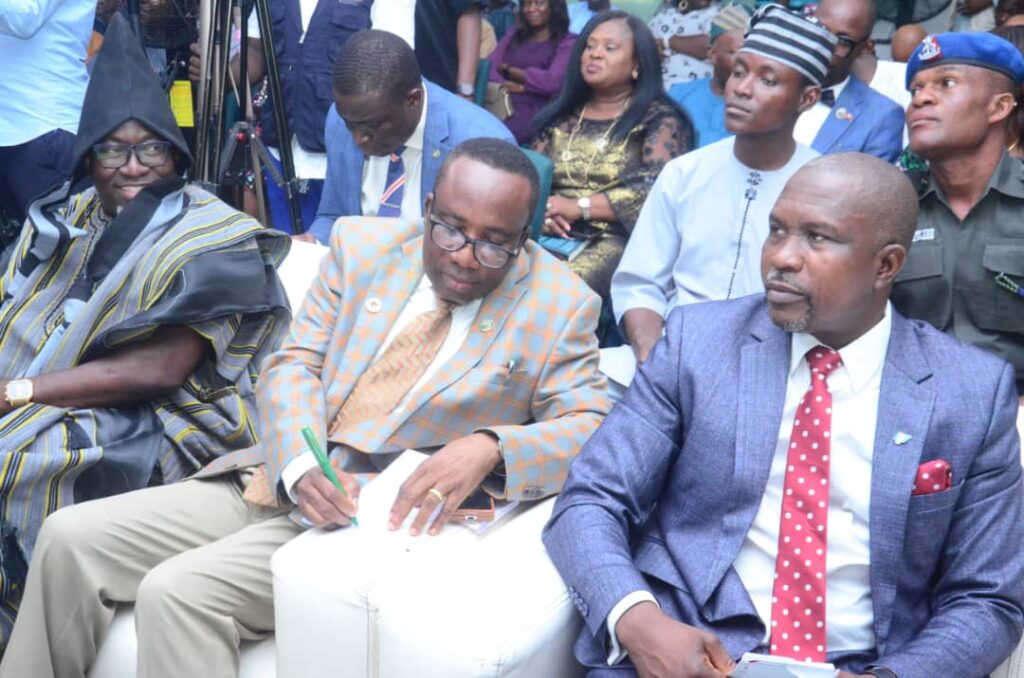Senator Shuaib Afolabi Salis, Chairman of the Senate Committee on ICT and Cybersecurity, has cautioned journalists not to see Artificial Intelligence (AI) as a threat to their survival, insisting that technology is only an enabler of journalism, not a replacer.
Salis, who represents Ogun Central Senatorial District, stated this while delivering the keynote address at the opening ceremony of the 2025 Ogun NUJ Press Week in Abeokuta, themed “The Future of Journalism: Navigating AI and Objective Reporting.”
According to him, journalism has always adapted to technology, from the era of typewriters to the digital age, and AI is simply another tool that can aid speed, cost efficiency, fact-checking, and investigative reporting.
“AI can be used for investigative journalism, for fact-checking, and to measure audience engagement. But let me be clear: AI is an enabler, not a replacer. It lacks human touch, it has no emotions, and cannot replace the judgment of a professional journalist,” he said.
The senator listed the benefits of AI as faster news delivery, cost efficiency, personalisation of news, and enhanced accuracy. However, he warned that the technology also comes with challenges.
“There are biases in algorithms that can favour the rich over the poor. There are ethical concerns, questions of transparency, accountability, and issues of data privacy.
“AI also risks deepening the divide between the Global South and the Global North,” Salis cautioned.
He added that quackery was becoming a major threat to the profession. “Your profession is under threat. There are more quacks than professional journalists today, because anyone with a smartphone and data can publish content,” he said.
Salis revealed that the National Assembly is working on two key laws to strengthen Nigeria’s digital future – the National Digital Economy and E-Government Bill and the review of the Cybercrime Act.
“Some of our laws are still analogue. The Digital Economy Bill, which has passed second reading, will give digital signatures the same legal recognition as physical signatures. This will modernise our economy. The World Bank has already shown interest in this initiative,” he explained.
He also disclosed that Nigeria had developed a National AI Strategy, co-created by Nigerian experts from across the world, which has earned the country global recognition as one of the top 10 nations with a comprehensive AI policy.
Salis urged the Nigeria Union of Journalists (NUJ), the Broadcasting Organisation of Nigeria (BON), the Press Council, and the Newspaper Proprietors’ Association of Nigeria (NPAN) to jointly push for AI to be embedded in journalism curricula.
“If you are a lawyer or a journalist and you are not technology-savvy, you are not truly learned. Go back to your institutes and ensure AI becomes part of your curriculum,” he said.
He further stressed the need for continuous capacity building, professional differentiation, and collaboration.
“There must be a way to distinguish content generated by AI from those written by journalists. Media houses must also learn to collaborate – it is better to have five percent of 100 than 100 percent of zero,” Salis said.
In his remarks, Ogun State Governor Dapo Abiodun, represented by the Head of Service, Mr. Kehinde Onasanya, described the theme as timely.
“The future of journalism is linked to AI. It is not meant to take your jobs but to help the profession. My administration is upgrading infrastructure in state-owned media and supporting workshops to build capacity,” the governor said.
Former governor Ibikunle Amosun, represented by Alhaji Bola Adeyemi, also described AI as an important enabler. “Journalists must embrace AI for the growth of their profession,” he advised.
In his welcome address, NUJ Ogun Chairman, Mr. Wale Olanrewaju, said the press week was not just for celebration but also reflection.
He urged journalists to remain ethical, credible, and forward-looking, while commending Salis for donating 20 laptops and 10 solar-powered streetlights to the union.
Goodwill messages also came from veteran journalist Mr. Eddy Aina, who commended the NUJ leadership for showcasing its achievements, and former Commissioner, Barr. Demola Badejo, who cautioned against over-reliance on the concept of “veterans” in journalism, stressing the need for growth through professionalism rather than politics.
Declaring the week open, Governor Abiodun stressed that press weeks should serve as platforms for stocktaking and strategy, not mere rituals.
“We must take stock of what we have done, reflect, and plan ahead. AI is not a threat; it is an opportunity. Journalists must remain objective because public confidence in journalism is what sustains democracy,” he said.
Do you want to share a story with us? Do you want to advertise with us? Do you need publicity for a product, service, or event? Contact us on WhatsApp +2348183319097 Email: platformtimes@gmail.com
We are committed to impactful investigative journalism for human interest and social justice. Your donation will help us tell more stories. Kindly donate any amount HERE




